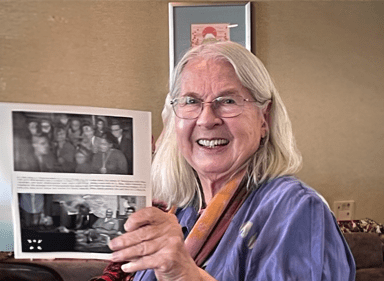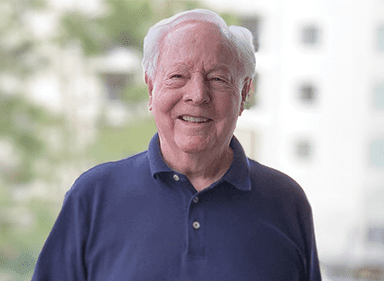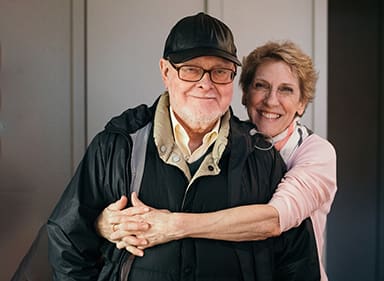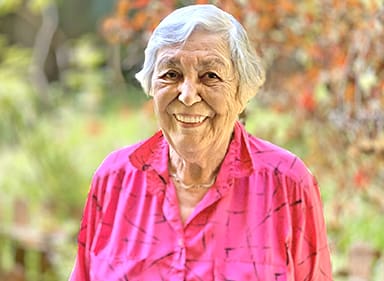April 4, 2024
Wesley Palms resident Ellie Shacter shares lessons learned from working with Martin Luther King Jr.
Throughout her life, Ellie Shacter has longed to see conflict resolved in peaceful ways. Her work with the Fellowship of Reconciliation in the 1950’s led her to the house of Martin Luther King, Jr. during the Montgomery bus boycott. What she learned from his work of non-violent protest has continued to inform her understanding of the world and how we live in it — an understanding that she has shared with her fellow residents at Wesley Palms.
Growing up in southwestern Wisconsin during World War II, the anxiety of conflict loomed even though the war itself was far away. “Having no idea about geography and distances, I learned to identify planes by silhouette in case they flew over the farm,” she said.
As a student at the University of Wisconsin, Madison, Ellie joined the Methodist Youth Fellowship and attended a presentation by the American Friends Service Committee on the arguments against pacifism. “He was dealing with the very subject of war and peace and how to resolve conflict,” she said. “It answered all my basic questions. I spent the next year reading literature on ethical and moral violence and what a good Christian does.”

After graduating in 1956 with a double-major in English and History, Ellie went to New York City, looking for a role that supported her desire to work for peace. “I knew the names of the peace organizations and told them I was looking for a job.” She was hired by the Fellowship of Reconciliation as one of its first regional field directors, covering Michigan, Ohio, Western Pennsylvania and Western New York.
Her work coincided with the start of the Montgomery bus boycott. To avoid the impression she and other members of the Fellowship were northerners sent to tell others what to do, Ellie took a leave of absence and paid her own way to Montgomery to observe the movement.
By the time Ellie arrived, the boycott had been going on almost one year. After her first night in Montgomery, she and Glenn Smiley, the national field secretary for the Fellowship of Reconciliation, walked over to Dr. King’s house. “Dr. King, of course, had studied Gandhi and nonviolence when he was in seminary, and he’d been thinking about it ever since,” Ellie explained. “When the boycott began, it was simply supposed to be a one-day strike. But when it became a movement of love and non-violence, [Glenn Smiley] just got on the bus, knocks on Dr. King’s door, introduced himself and the Fellowship of Reconciliation and said, ‘What can we do to help?’ So that’s how I got acquainted.”
Learning from Dr. King and others has continued to inform Ellie’s ongoing efforts for peace and justice. “We think we know exactly what needs doing in a situation whether we know anything about it or not,” she said. “I keep just trying to learn.”
Ellie continues her dedication to peace and non-violence as a member of the Society of Friends in San Diego.
She also shares what she’s learned with others, including a recent presentation to her fellow-residents at Wesley Palms on Martin Luther King Day. Along with recounting her personal experiences, she distributed copies of a comic book still used to illustrate the principles of non-violent resistance. Learning the principles “gives you the tools in advance, so when you do encounter a situation, you’re ready.”
Even at 90, Ellie has more to do. “I’m always working on one project or another. Who would think that I would still be working and talking about it – something I did when I was 22?”


